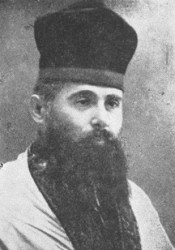Born on 6 October 1871 in Chişinău, he early started to sing in the choir of the synagogue where his father
was a prayer leader, and got his father to let him go to Odessa so as to study cantorial singing. He was the elder brother of Arnold
Georgievskij.
In 1902 Steinberg took his first big post in Odessa's Ahrele Synagogue, moved on to Berditchev, then to Vilnius, returning to Odessa
as cantor of the Great Synagogue in 1910. He remained in Odessa for fourteen years.
In 1924 Steinberg emigrated to America, holding positions at the Brisker's Synagogue of Newark, the Montefiore Synagogue of the
Bronx (three years), and the Woodrow Avenue Synagogue of Boston. In 1929 Paramount Pictures made him a handsome offer to appear in
the new talking films, which he declined.
While on a concert tour in London in 1932, he was persuaded to return to Vilnius and remained in Europe for five years, one of which
he spent in Chernivtsi.
In 1937 Steinberg returned to New York and officiated at the Hebrew Institute of University Heights until his death on 27 November
1941 at the age of 70.
Steinberg was a composing cantor, meaning that he typically sang self-composed music (although for some of his recordings, no composer
is known, I'm pretty sure they're all his own compositions); more than that, he was so important as a composer that his music was
also sung by others, for example by Joseph Schmidt, among whose few cantorial recordings
we find two pieces written by Steinberg.
